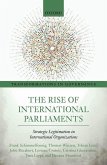National parliaments are central to the political systems of western Europe. Yet what role have they played in the development of the European Union? This volume is the first to study in depth how national parliaments have adapted to the effects of the Single European Act and the Maastricht Treaty. Detailed studies of ten parliaments allow generalisations to be drawn about national parliaments - how they have adapted, or not adapted, to European integration. The authors provide depth, looking at each parliament from the time of membership and identifying the key stages of institutional change. The country studies are complemented by an analysis of how changes are viewed from the institutions of the European Union and chapters that establish the context of change and pinpoint the reasons why national parliaments have changed - and the problems facing them as means of remedying the perceived 'democratic deficit' within the EU. National parliaments figure prominently in the debate about the democratic deficit and the future of the European Union. This volume provides, for the first time, the material that is essential for an informed debate.








